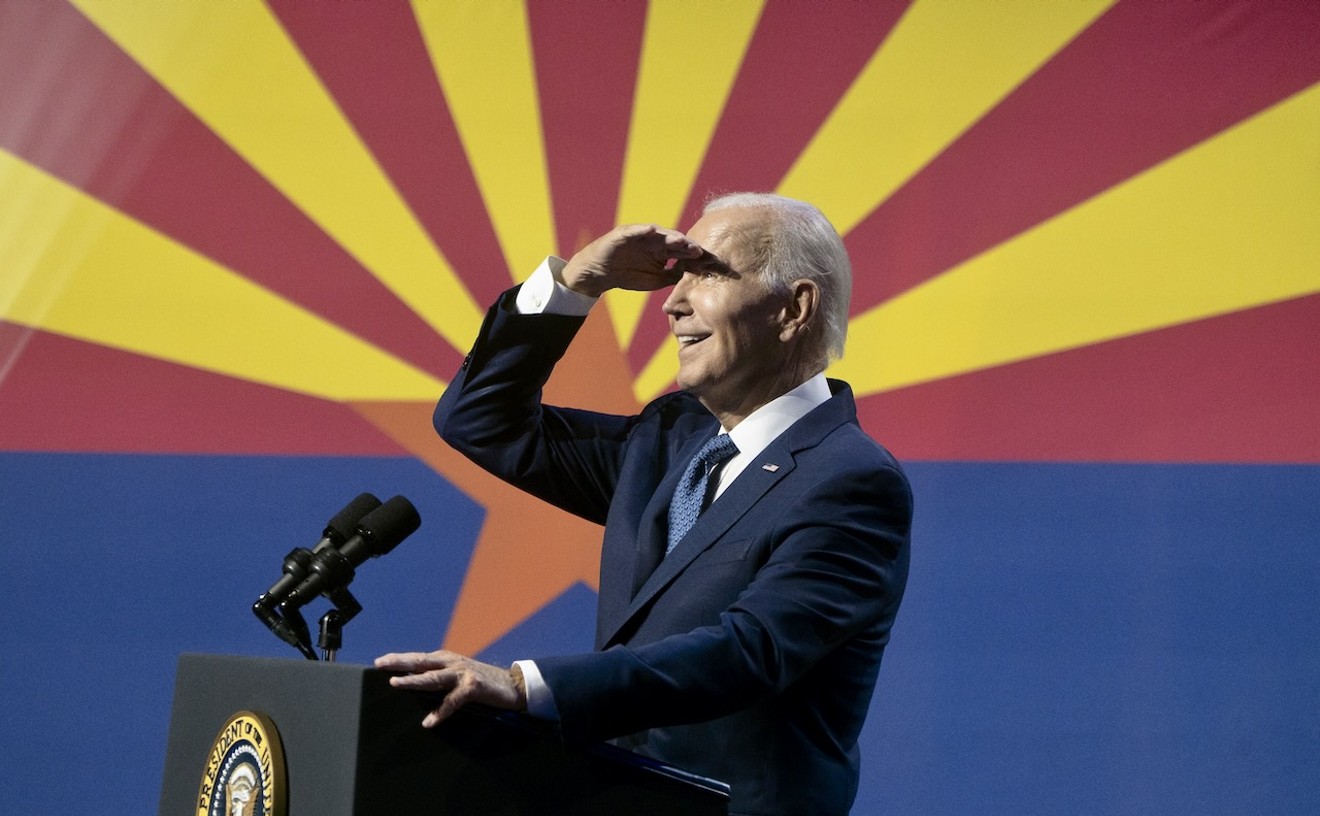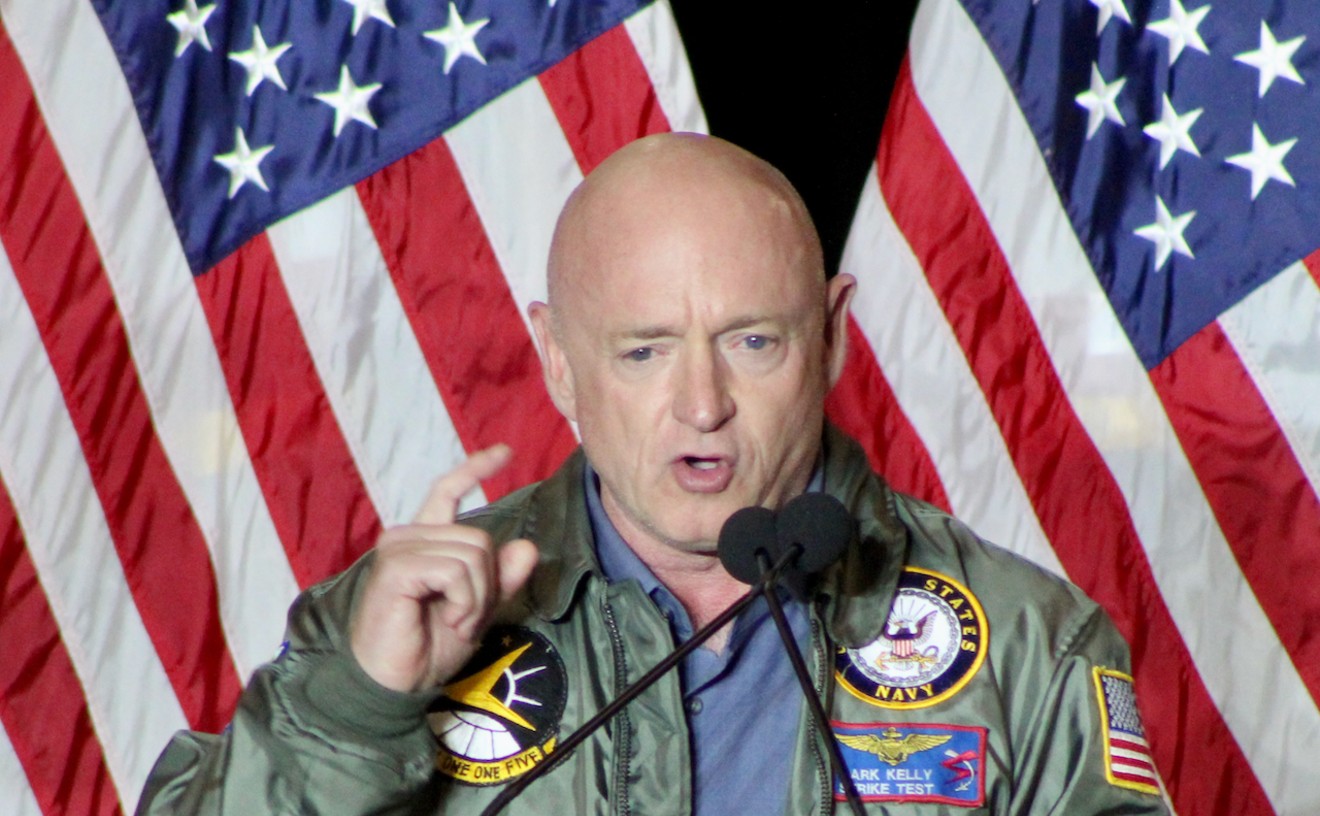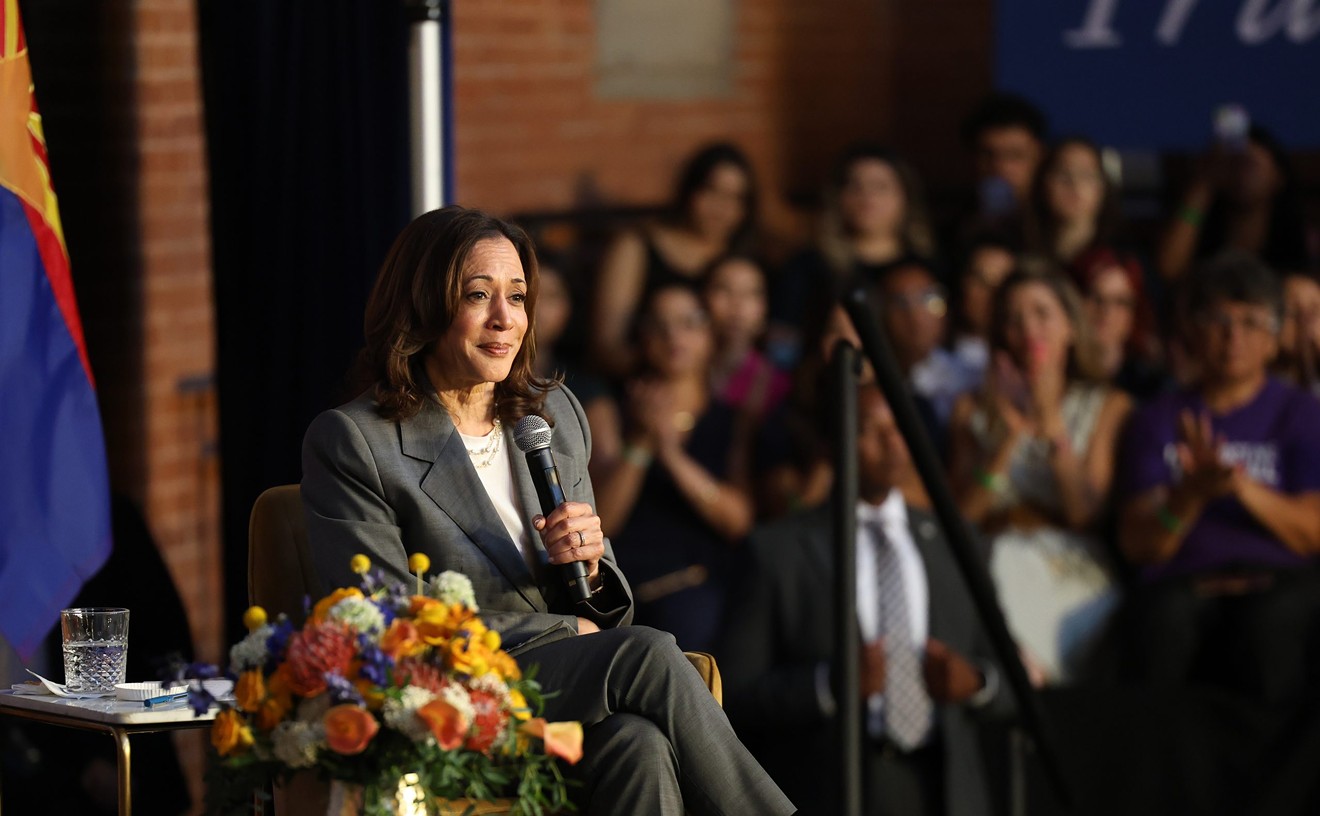The following post was written by Sam Levin, an editorial fellow at New Times' Denver-based sister paper, Westword. Although Senator John McCain easily won Arizona in the 2008 election, team Obama believes Arizona is in play this time around. Read on for observation and analysis from last night's debate.
President Barack Obama and former Massachusetts Governor Mitt Romney squared off inside the University of Denver's Magness Arena last night, once again bringing the national spotlight to the Mile High City -- as the two candidates discussed the economy and the role of government in a surprisingly unstructured first presidential debate.
Romney and Obama -- who have both spent a lot of time in the last several months rallying Colorado voters -- frequently interrupted each other during the debate, and Jim Lehrer, the increasingly flustered moderator, often seemed unable to keep the conversation under control. This was especially true during several interactions the PBS NewsHour anchor had with Romney, who was particularly aggressive and confident during the debate -- with the president's deputy campaign manager even saying afterward that the Republican candidate "won on style."
The awkward interruptions and chaotic moments of the debate frequently got laughs and scoffs from inside the giant media filing room, where hundreds of reporters from all over the United States and beyond typed and Tweeted furiously during the ninety-minute event.
Sam Levin From inside the media room
Here's an exchange toward the end of the event (access the full transcript here), during which Lehrer seemed to acknowledge that things had gotten a little out of hand:
"Alright, gentlemen, listen," Lehrer said as Obama interrupts to try to get a word in.This kind of stumbling was common throughout the night. And the interruptions from Romney, who repeatedly continued speaking and attacking the president even after Lehrer requested they move on, reflected an overall level of comfort and poise that political experts -- and Romney fans -- say worked in his favor.
"Excuse me sir," Lehrer continued. "We've got barely...three minutes left. I'm not going to grade the two of you and say your answers have been too long or I've done a poor job."
"You've done a great job, Jim," the president interjected.
Lehrer continued, "Oh, well, no. But the fact is, government, the role of government and governing.... So we only have three minutes left in the debate before we go to your closing statements. And so I want to ask finally here, and remember we've got three minutes total time here. And the question is this...
Much of the back and forth of the debate was characterized, unsurprisingly, by both sides arguing that they were being misrepresented by the opponent -- which in the case of some complex topics like health care and federal regulations created some rather dizzying, wonky policy disputes.
Continue for more about the view of the debate from the University of Denver media room.
For example, after a lengthy back and forth on Medicare, Lehrer interrupted by saying, "Can the two of you agree that the voters have a choice, a clear choice between the two of you on Medicare?"
"Absolutely," Romney said as Obama replied, "Yes."
There was also significant disagreement -- which would be clear to anyone who has attended rallies featuring the two -- on what their respective tax plans would mean for the middle class.
"This is where there's a difference because Governor Romney's central economic plan calls for a five trillion dollar tax cut, on top of the extension of the Bush tax cuts," Obama said near the beginning of the debate. "So that's another trillion dollars. And two trillion dollars in additional military spending that the military hasn't asked for. That's eight trillion. How we pay for that, reduce the deficit and make the investments that we need to make without dumping those costs on the middle-class Americans I think is one of the central questions of this campaign."

Sam Levin After the speech ended
Romney responded: "I'd like to clear up the record and go through it piece by piece. First of all, I don't have a five trillion dollar tax cut. I don't have a tax cut of the scale that you're talking about. My view is that we ought to provide tax relief to people in the middle class. But I'm not going to reduce the share of taxes paid by high-income people. High-income people are doing just fine in this economy. They'll do fine whether you're president or I am. The people who are having the hard time right now are middle-income Americans."
In a notably Twitter-friendly moment, Romney later described his proposed cuts while throwing in a joke about Sesame Street.
He said, "I will eliminate all programs by this test, if they don't pass it: Is the program so critical it's worth borrowing money from China to pay for it? And if not, I'll get rid of it. Obamacare is on my list. I apologize, Mr. President. I use that term with all respect.
"I like it," the president said.
"Good," Romney replied. "So I'll get rid of that. I'm sorry, Jim. I'm going to stop the subsidy to PBS. I'm going to stop other things -- I like PBS. I love Big Bird. I actually like you, too."
On health care, Obama argued that Romney's opposition was ironic given his own record of adopting an "identical model" in Massachusetts, saying further that Romney hasn't offered any concrete alternative ideas other than stating his plans to repeal the health care plan the president adopted.
Romney said that under his plan, pre-existing conditions would be covered and young people would be able to stay on their family plan, but argued that Obama's health care plan is irresponsible and that government is "not effective in bringing down the cost of almost anything."
The two also sparred over regulation of Wall Street, with Obama saying, "Does anybody out there think that the big problem we had is that there was too much oversight and regulation of Wall Street? Because if you do, then Governor Romney is your candidate. But that's not what I believe."
Romney interjected: "Sorry...that's just not the facts. Look, we have to have regulation of Wall Street. That's why I'd have regulation. But I wouldn't designate five banks as too big to fail and give them a blank check. That's one of the unintended consequences of Dodd-Frank [a Wall Street reform act]. It wasn't thought through properly."
Both closed with a predictable promise to the middle class.
Obama said: "Four years ago, I said that I'm not a perfect man and I wouldn't be a perfect president. And that's probably a promise that Governor Romney thinks I've kept. But I also promised that I'd fight every single day on behalf of the American people and the middle class and all those who are striving to get in the middle class."
Romney concluded by saying, "I will not cut our commitment to our military. I will keep America strong and get America's middle class working again."
Continue for an expert analysis of the debate from the University of Denver.
Amid the chaos in the media room, where surrogates from across the country were bombarded by reporters, we found Seth Masket, an associate professor of political science at the University of Denver, who offered us his take on the debate and the larger implications in this tight race.

Sam Levin Media room
"For those who were not deeply familiar with the candidates before, you saw a pretty strong Mitt Romney coming off pretty aggressively, willing to pick some fights with his opponent, pick some fights with the moderator," he said. "It's really not something we've seen a whole lot before."
Masket said that In addition to this unexpected charisma -- as others have noted since the debate -- Romney seemed to have moved away from some of the more far-right positions of his and Paul Ryan's platform, instead appealing to viewpoints more in the center.
"He seemed to be in some ways kind of repositioning himself," Masket said. "The inevitable pivot to the center really kind of happened within the last ninety minutes. It's in some ways pretty surprising. I'm wondering how much he'll get criticized for switching his policy positions."
Masket continued, "He seemed to be redefining his stances on taxes, or at least reframing them a lot.... and also on regulation of businesses of Wall Street. He said, 'We need regulation for the private sector to work.' Not something we've seen a whole lot before from him."
Obama perhaps was unprepared to respond to this kind of presentation, Masket said. "In my opinion, he could've gone at [Romney] a lot harder than he did."
But, he pointed out, "In many ways, the first debate often...favors the challenger, simply because particularly Romney comes off a spring with twenty Republican debates. Obama hasn't done this in four years. He's a little rustier. Most of his experience in recent years has been speeches, town hall meetings. It's a very different style."
The e-mail blasts from the two campaigns immediately after the debate also offer some useful insight. The Republican National Committee in Colorado sent an e-mail with links to Tweets saying Romney was winning, writing:
Across the battleground states the reviews are in. Governor Romney won the debate because he laid out the clear choice and a clear plan for voters. President Obama was "defensive," "perplexed," "aggravated," "irritated," "flat-footed," and "unprepared."And the Obama campaign, with an 11 p.m. e-mail featuring the subject line "Facts Matter and Mitt Romney Didn't Deliver Them," seemed to subtly acknowledge the difference in performance: "While Mitt Romney's rhetoric may have sounded polished tonight, it just wasn't true. On issue after issue, Romney avoided giving specifics and, in several instances, told flat-out falsehoods."










